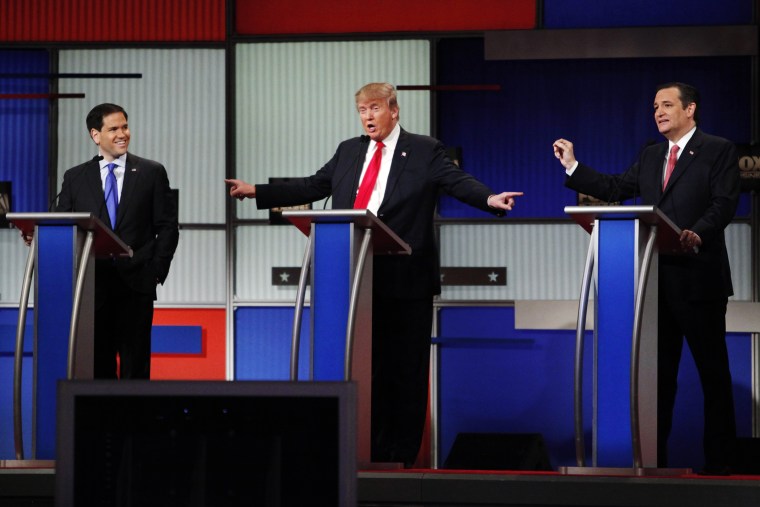It's been hard to miss the degree to which Republican insiders have warmed up to Donald Trump's candidacy of late. After months of panicked hand-wringing about Trump's position atop GOP polls, much of the party's "establishment" recently entered the acceptance phase in the stages of grief.
Dana Milbank wrote the other day, "That soft flapping sound you hear is the Grand Old Party waving the flag of surrender to Trump. Party elites ... are acquiescing to the once inconceivable."
But the shift didn't just occur out of a sense of resignation. Away from the Beltway, there was growing evidence that the Republican race was becoming a two-man contest between Trump and Ted Cruz. Party insiders had to decide whom they hated less. Trump prevailed.
Or did he? Matt Yglesias noted a scheme yesterday that is slowly becoming a more common topic of conversation in GOP circles.
[O]ver the weekend, one political operative floated to me a theory that began to rapidly gain credence on Monday. Establishment Republicans aren't choosing Trump over Cruz because they prefer Trump to Cruz. They are backing Trump over Cruz because they think doing so is the best way to stop Trump.
Stick with me for a minute because there's a decent chance that this gambit, which sounds nutty, is actually the plan establishment Republicans intend to pursue.
The idea here is that when insiders moved towards Trump, it was part of a two-step process: the establishment would (1) try to take down Cruz by boosting his principal rival, and (2) then turn around soon after, taking down Trump once Cruz is out of the way.
I told you this sounds nutty.
Republican insiders went after Cruz first, in part because they genuinely detest him, but also because the first nominating contest is in Iowa, a state the Texas senator was on track to win. If Cruz prevails in the Hawkeye State, he'll likely get a boost heading into New Hampshire -- where Trump has a big lead -- setting the stage in earnest for a Cruz-Trump showdown for the nomination.
Without an Iowa win, however, Cruz faces a far more difficult future. It's the first domino in his plan, and if it doesn't fall, his prospects diminish greatly. For establishment Republicans, the choice was obvious: help Trump early, give him a boost at a crucial time, and make it more likely that Trump will win Iowa and do lasting damage to Cruz.
Then what? Well, once that's done, the argument goes, then the establishment can start moving back away from Trump and towards a candidate insiders can tolerate. Republican strategist Alex Castellanos envisions a dynamic in which Trump wins Iowa; Marco Rubio finishes "third or better" in the caucuses; Cruz starts to collapse after underperforming in a state he expected to win; and New Hampshire becomes a Trump-Rubio contest.
Presumably, after New Hampshire, some of the other more establishment candidates will quit; Cruz will struggle to regain his footing; and Bush/Christie/Kasich backers will get in line.
And just like that, Trump, stuck at his ceiling, will face one Republican insiders can accept instead of four, that "mainstream" candidate will consolidate party backing, and the establishment, wiping nervous sweat from its brow, will win again.
And who knows? Maybe the race really will unfold this way. But I'd recommend some caution.
First, this plan, such as it is, not only involves the Republican establishment acting with remarkable agility and coordination, it also is predicated on the idea that GOP voters will shift in large numbers away from their preferred candidate to a non-Trump candidate after Iowa and New Hampshire. Such a scenario is hardly a sure thing. If Cruz stumbles, for example, and it's a two-man race between Rubio and Trump, why should we assume Rubio would be the beneficiary of the bulk of Cruz's supporters?
Second, and this is probably the more important point, this plan involves watching Trump win Iowa, New Hampshire, and probably South Carolina while Republican insiders figure out which of their candidates will represent their "lane."
At that point, it'll be far too late to matter.
